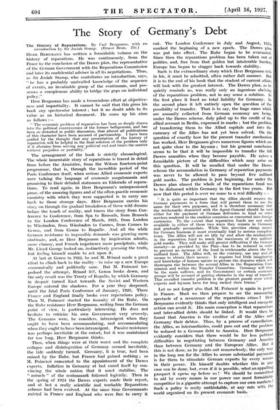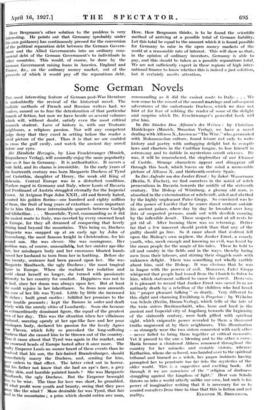The Story of Germany's Debt
The History of Reparations. By Carl Bergmann, with an introduction by Sir Josiah Stamp. (Ernest Bann. 21s.) HEan BERGMANN' has written a formidable volume on the history of reparations. He was continuously, from the Peace to the conclusion of the Dawes plan, the representative of the German Government with the Reparations Commission and later its confidential adviser in all its negotiations. Thus, as Sir Josiah Stamp, who contributes an introduction, says, " he has a probably unrivalled knowledge of the sequence of events, an invaluable grasp of the continuum, and pos- sesses a conspicuous ability to bridge the gaps on individual policy."
Herr Bergmann has made a tremendous effort at objective- ness and impartiality. It cannot be said that this gives his book any spectacular interest ; but it no doubt adds to its value as an historical document. He sums up his aims as follows :-
" The economic problem of reparation has been so deeply drawn into the political controversies of the former belligerents, and has been so distorted in public discussion, that almost all publications of this character have been accused of partisanship. I have been guided by the thought that any presentation of the history of reparation will be helpful in the final solution of the problem only if it abstains from serving any political end and treats the matter without prejudice or partiality.',
The arrangement of the book is strictly chronological. The whole lamentable story of reparations is traced in detail from before the Armistice, from the Wilson fourteen-point progranune, that is, through the incredible period of the Paris Conference itself, when serious Allied economic experts were talking the language of economic megalomania and promising to their deluded statesmen an Eldorado of repara- tions. To read again, in Herr Bergmann's unimpassioned prose, of the amazing figures and of the often puerile economic casuistry with which they were supported is to carry one back to those strange days. Herr Bergmann carries his story on through the gradual breakdown of these wild dreams before the touch of reality, and traces the story from Con- ference to Conference, from Spa to Brussels, from Brussels to the London Conference of March, 1921, from London to Wiesbaden, from Wiesbaden to Cannes, from Cannes to Genoa, and from Genoa to Rapallo. And all the while German resistance to impossible demands was growing more obstinate, and, as Herr Bergmann by implication admits, more clumsy, and French impatience more precipitate, while Mr. Lloyd George looked on, instinctively guessing the truth, but feeling himself unable to act upon it.
At last at Genoa in 1922, he and M. Briand made a great effort to climb back to the reality—to raise up a new Europe economically and politically sane. But M. Poincare tor- pedoed the attempt, Briand fell, Genoa broke down, and the only result was the Treaty of Rapallo, by which Germany in despair turned East towards the Soviet and Western Europe entered the shadows. For a year they deepened, until the fatal Paris Conference of January, 1923, There France and England finally broke over reparations policy. Then M. Poineare started the insanity of the Ruhr. On the Ruhr resistance Herr Bergmann, writing from the German point of view, is particularly interesting. He does not hesitate to criticize his own Government very severely. The Germans were, he considers, intransigent when they ought to have been accommodating, and accommodating when they ought to have been intransigent. Passive resistance was perhaps inevitable at the outset, but it was maintained far too long, Herr Bergmann thinks.
Then, when things were at their worst and the complete collapse and disintegration of Germany seemed inevitable, the tide suddenly turned. Germany, it is true, had been ruined by the Ruhr, but France had gained nothing ; so M. Poineare consented to the appointment of the Dawes experts. Inflation in Germany at last cured itself by con- vincing the whole nation that it must stabilize. The " miracle" of the rentetunark followed logically. Then in the spring of 1924 the Dawes experts made their report, and at last a really scientific and Workable Reparations scheme had been evolved. At the same time Govermisents existed in France and England who were free to carry it
out. The London Conference in July and . August, 192i, marked the beginning of a new epoch. The Dawes plan was put into effect. The Ruhr began to be .evacuated. Since then the reparations problem has been taken out of
politics, and, free from that golden but .intolerable burden, Europe has begun to stagger back towards stability.
Such is the extraordinary story which Herr Bergmann tell, in his, it must be admitted, often rather dull manner. But it is to the end of his book that the student of current affair. will look with the greatest interest. The Dawes plan, as he quietly reminds us, was really only an ingenious shelving of the reparations problem, not in any sense a solution. In the first place it fixed no total liability for Germany. In the second place it left entirely open the question of the possibility of transfer. That is to say, the huge sums which are annually collected from German economy are being, tinder the Dawes scheme, duly piled up to the credit of the allied account in Berlin, expressed in marks ; but the problem of transferring them to the Allied capitals and into the currency of the Allies has not yet been solved. On the question of exactly how far the present transfer mechanism has worked, Herr Bergmann gives numerous figures which arc not quite clear to the layman ; but his general conclusion seems to be that it will be impossible to transfer the full Dawes annuities when they become payable. /Ie raises a formidable picture of the difficulties which may arise on this question. It will be recalled that under the Dawes scheme the accumulation in Germany of reparation payments
was never to be allowed to pass beyond five milliard gold marks. The problem is. just beginning, for under the Dawes plan almost the whole of the reparations fund was to be disbursed within Germany in the first two years. But now that this period is over we come to a real difficulty :--
" It is quite as important that the Allies should receive the German payments in a form that will permit them to use the same for their own purposes, and it is therefore necessary that the reichsmarks deposited with the Agent-General should be used either for the payment of German deliveries in kind or other services rendered to the creditor countries or converted into foreign currencies. To the extent that reparation funds are not made available in either of theie two ways they remain in Germany and gradually accumulate. While this provides cheap money for German business it must eventually lead to serious complica- tions. The Allies will not sit idly by and allow the reichsmarke in the reparation fund to reach the maximum of five milliard gold marks. They will make still greater difficulties if the German annuity—as provided by the Plan—has to be reduced in order to prevent an increase of the fund in reichsmarks above the five milliard limit. The Allies will, on the contrary, use any and all means to obtain their money. It requires but little imagination and knowledge of human nature to picture the disputes which will thereupon rise between the several Allies in the Reparation Com- mission and within the Transfer Committee. Germany will then be the main sufferer, and its Government or certain economic groups will be accused of putting obstacles in the way of transfer. This so-called transfer problem is the greatest puzzle over which experts and laymen have for long racked their brains."
Let us not forget also that M. Poincare is again in power in France. Must we then prepare to see the nauseating spectacle of a recurrence of the reparations crises ? Herr Bergmann evidently thinks that only intelligent and energetic action can avoid it. His main conception is that reparations and inter-allied debts should be linked. It would then he found that America is the creditor of all the 'Allies and Germany their debtor. Thus, by a process of cancellation. the Allies, as intermediaries, could pass out and the problem be reduced to a German debt to America. Herr Bergmann evidently considers that there would be far less political difficulties in negotiating between Germany and America than between Germany and the European Allies. But if this is not done, as he points out remorselessly, the only waY in the long run for the Allies. to secure substantial payments is for them to 'stimulate German' exports by every means
in their power. He himself doubts whether this in any case can be done, but, even if it is possible, what an appalling.
prospect it opens up before us ! - We should be committed to aid by every means in our power our most formidable competitor in a gigantic attempt to capture our own markets Such a policy is really unthinkable, at any rate with the world organized on its present economic basis. Ilenr Bergmann's other solution to the problem 'is very interesting. He points out that Germany (probably under his own guidance) has continuously pressed for the conversion of the political reparation debt between the German Govern- ment and the Allied Governments into an ordinary com- mercial debt of the German Government's to individuals in other countries. This would, of course, be done by the Gemian Goverrunent raising loans in America, England and France, &c., on the ordinary money market, out of the proceeds of which it would pay off the reparations debt. Here, Herr Bergmann thinks, is to be found the scientific method of arriving at a possible total of German liability. Let this total be equal to the amount which it is found possible for Germany to raise in the open money markets of the world at a reasonable rate of interest. This will show us that, in the opinion of ordinary investors, Germany is able to pay, and this should be taken as a possible reparations total, We are not sufficiently expert in these regions of high inter- national finance to know whether this is indeed a just solution, but it certainly merits attention.



































 Previous page
Previous page